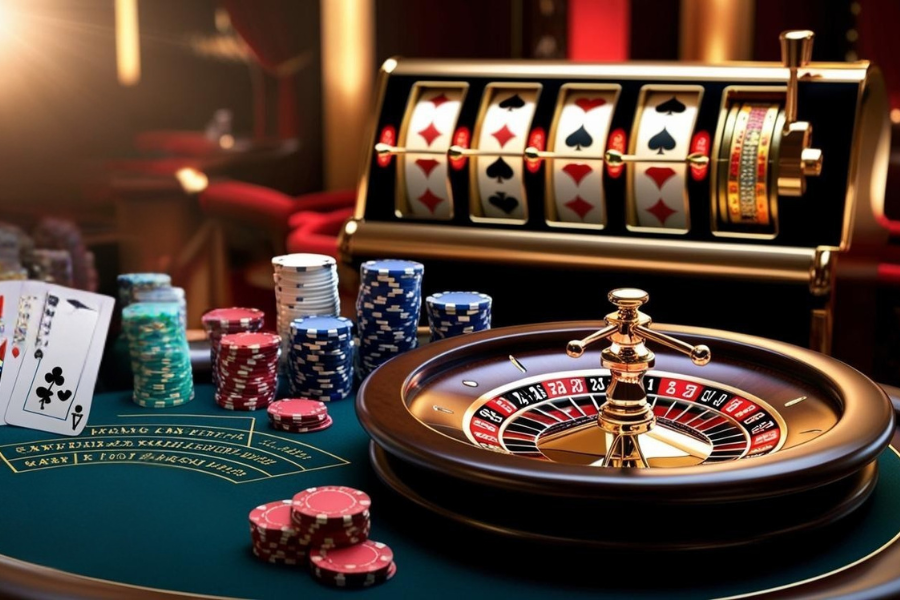Gambling has always been filled with myths and superstitions. Many players hold onto beliefs about "hot" and "cold" slot machines or think that lucky charms can change the outcome of their games. These misconceptions can trap even the most seasoned casino goers. But how much of this is rooted in reality? If you wish to approach casino games with a sharper perspective, you must discern between fact and fiction. Let's take a deeper look at some of the most common gambling fallacies and discover what truly matters when you're at the casino.
Myth #1: Hot and Cold Slot Machines Do Exist
Reality: Every Spin is Random
A widespread myth regarding gambling is that slot machines have "hot" and "cold" streaks. Many players believe that if a machine hasn't paid out in a while, it must be "due" for a win, whereas a machine that has recently paid out is considered "cold" and less likely to pay out again soon.
The reality? Slots function using a Random Number Generator (RNG) system, which guarantees that each spin is independent of the previous one. The result of a spin is determined at the exact moment you hit the button, meaning that past outcomes have no bearing on future spins. Whether a machine has paid out a jackpot minutes ago or not at all in days, the odds remain exactly the same.
What Actually Works?
Instead of chasing hot or cold machines, focus on understanding RTP (Return to Player) percentages. Slots with a higher RTP will statistically return more money over time. However, keep in mind that this is measured over thousands of spins, not in short sessions.
Myth #2: Lucky Charms Can Help You Win
Reality: Luck is Purely Random
Lots of people who gamble carry good luck charms, put on certain colors, or do special things before they play. They might have a rabbit's foot for luck, a coin they think is special, or a routine they do before games. These folks think these things or actions can have an impact on how the game turns out.
Here's the thing: casino games rely on chance and randomness to function. As much as you wish it were so, neither the rituals you perform nor any object you touch can manipulate the amount of money that results from spinning the roulette wheel or the images that a slot machine displays. Casinos make sure everything is fair with the help of high-tech RNGs and card shufflers. While your lucky item may boost your confidence around the game, it will do nothing to change the outcome of the game itself.
What Actually Works?
Instead of relying on superstitions, learn the strategies that improve your odds. In games like blackjack, using basic strategy can significantly reduce the house edge. In poker, developing strong decision-making skills can make you a winning player in the long run.
Myth #3: Card Counting is Illegal
Reality: It’s Legal but Highly Discouraged
Hollywood movies have made card counting in blackjack seem like a criminal offense. Many players think that if they are caught counting cards, they could be arrested or banned from all casinos forever.
In reality, card counting is not illegal. It’s simply a mental strategy used to keep track of high and low-value cards remaining in the deck. However, casinos dislike card counters and may ask them to leave or ban them if they are caught. Casinos employ countermeasures like automatic shuffling machines and multiple deck games to make counting more difficult.
What Actually Works?
If you want to improve your blackjack game without getting thrown out, learn and practice basic blackjack strategy. Many online tools and apps can help you master the optimal way to play each hand, reducing the house edge.
Myth #4: Online Casinos are Rigged
Reality: Licensed Casinos Use Fair Gaming Practices to Ensure Better Outcomes
Some gamblers may believe online casinos rig their games to make sure players are always on the losing side. This is a true fact since a few sketchy unlicensed sites exist out there. But legit online casinos face strict regulations and use RNG tech to keep things fair.
Watchdogs like the UK Gambling Commission and Malta Gaming Authority make online casinos go through tough audits and fairness checks to get licensed. On top of that, groups such as eCOGRA take a look at the games to make sure the results are random.
What Actually Works?
To ensure fair play, make sure to choose licensed and reputable online casinos. Before signing up, cross-check their certifications, read reviews, inspect their gaming extensions and verify their payout policies.
Myth #5: The Casino Controls Who Wins
Reality: Casinos Have a House Edge, Not Control
A lot of people who gamble may think that the casinos take the wheel on controlling how games turn out. They believe these places tweak slot payouts or mess with table games to make more money. It's true that casinos rake in cash, but they don't need to cheat to do it. Every game has a built-in house edge, which means that in the long run, the casino will come out on top.
The outcomes of games are determined by random number generators for digital games or by chance events like dice rolls and card shuffles. There is no human intervention in the results. The house doesn’t need to "cheat"—the mathematical advantage ensures they will come out ahead in the long run.
What Actually Works?
Instead of believing in misconceptions or any conspiracies, understand the odds of the games you play. Continue to play the games with the lowest house edge, such as blackjack, baccarat, and some video poker variants.
Learning to Play Casino with Knowledge and Strategy, Not Myths
In conclusion, many casino myths come from misunderstandings or wishful/imaginary thinking. Maybe it’s fun to have a lucky charm or believe in hot streaks, but the reality is that gambling is based solely on probability, not magic. If you want to improve your chances of winning, focus on successful strategies. This includes knowing the rules, understanding the nature of the game, managing your bankroll intelligently, and choosing games with the best odds and chances of victory. The next time you play casino games, remember: the best players rely on knowledge, not superstition.



